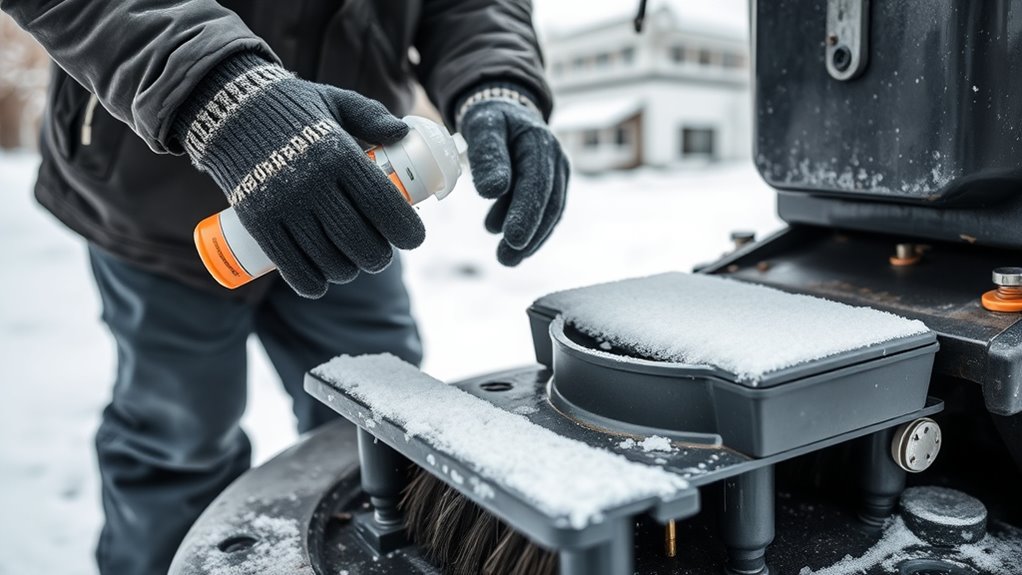To winterize your floor scrubber, start by fully charging the batteries and removing removable ones to store indoors in a warm, dry place. Drain all water from tanks, hoses, and internal parts to prevent freezing damage. Clean and rinse the system thoroughly, then cover the equipment with a waterproof tarp and store it in a sheltered area. Proper maintenance helps extend your equipment’s lifespan and keeps it ready for quick use when warmer weather returns. Keep going to learn more detailed steps to protect your machine.
Key Takeaways
- Fully charge batteries and remove removable ones; store indoors in a warm, dry environment.
- Drain all water from tanks, hoses, and internal components to prevent freezing damage.
- Use winter-specific chemicals with low freezing points; rinse systems thoroughly after use.
- Store the scrubber in a sheltered, dry area, and cover it with a weatherproof tarp for extra protection.
- Regularly inspect and maintain the equipment during winter to ensure readiness and prevent damage.

As winter approaches, preparing your floor scrubber to withstand the cold months is essential. Cold temperatures can negatively impact your equipment’s performance and longevity if you don’t take the necessary precautions. The first step is to focus on battery maintenance. Batteries are vulnerable to freezing temperatures, which can cause permanent damage or reduce their lifespan. To prevent this, make sure your batteries are fully charged before storing the scrubber for the season. A fully charged battery is less likely to freeze, as the chemical reactions inside remain active. If your scrubber has removable batteries, consider removing them and storing them in a warm, dry place indoors. Check the battery terminals for corrosion and clean them with a mixture of baking soda and water if needed. This simple step helps maintain a good connection and prevents future issues. Additionally, if your equipment has gel or AGM batteries, follow the manufacturer’s instructions for winter storage, as these types require specific care. Proper storage techniques can help prevent battery freezing and extend the lifespan of your equipment.
Chemical selection is another critical aspect of winterizing your floor scrubber. During colder months, using the correct cleaning chemicals can prevent damage to your equipment and ensure effective cleaning. Some chemicals can thicken or freeze in low temperatures, clogging nozzles or damaging internal parts. Always choose chemicals formulated for winter use or those with low freezing points, especially if you plan to operate the scrubber in unheated spaces. Dilution ratios may need adjustment to account for colder conditions, ensuring effective cleaning without overworking the machine. Keep in mind that some detergents or solutions can leave residues that freeze and cause blockages, so rinse the system thoroughly after each use. Also, avoid mixing incompatible chemicals, as this can produce hazardous reactions or impair cleaning effectiveness. Regularly inspect your chemical supplies, discarding any that have thickened or changed consistency, and replace them with winter-appropriate formulations.
In addition to battery maintenance and chemical selection, you should also clean and drain the entire system to prevent freezing. Remove any residual water from tanks, hoses, and pumps, and store the scrubber in a sheltered area away from extreme cold. Covering the equipment with a weatherproof tarp can provide extra protection against moisture and snow. Performing these steps ensures your floor scrubber stays in top shape during winter, ready to perform when the season ends. Proper winterization not only extends the life of your machine but also minimizes costly repairs and downtime. Taking the time to maintain your battery, select appropriate chemicals, and safeguard the equipment guarantees that you’ll be prepared to tackle cleaning tasks efficiently come springtime.
Frequently Asked Questions
Can I Winterize My Floor Scrubber if It’s Still in Use?
Yes, you can winterize your floor scrubber while it’s still in use, but it’s not ideal. Seasonal maintenance is best done when the equipment is not actively used, as it allows for thorough inspection and proper equipment storage. If you need to winterize during use, make sure you follow the manufacturer’s instructions carefully, drain any water, and remove components to prevent damage from freezing temperatures.
What Specific Parts Should I Check Before Winterizing?
Before winter storage, you should inspect key components like the battery, hoses, and filters. Check the battery for corrosion and proper charge, guaranteeing it’s in good shape. Examine hoses for cracks or leaks, and replace any damaged ones. Inspect filters and clean or replace them as needed. Performing a thorough component inspection helps prevent issues during winter storage and ensures your floor scrubber stays in top condition.
How Often Should I Perform Winterization During the Cold Season?
Think of winter as the lullaby your floor scrubber needs. You should perform winterization at least once a month during the cold season. Follow your maintenance schedule closely, ensuring all parts are checked and cleaned. Adhere to storage precautions, like draining fluids and disconnecting batteries, to prevent damage. Regular winterization keeps your equipment singing smoothly, ready to spring back into action when warmer days return.
Is There a Difference Between Winterizing Electric and Gas-Powered Scrubbers?
Yes, there’s a difference. For electric scrubbers, focus on battery maintenance—charge the batteries fully and store them in a cool, dry place. For gas-powered units, you need to stabilize the fuel to prevent gumming and corrosion. Both require proper winterizing, but electric models emphasize battery care, while gas models need fuel stabilization. Follow these steps to ensure your scrubbers stay in top shape through winter.
What Are the Signs That My Floor Scrubber Needs Winterizing Urgently?
If you notice battery corrosion, fluid freezing, or if your floor scrubber struggles to start or runs poorly in cold weather, it’s a sign you need to winterize urgently. These issues indicate that your battery and fluids aren’t safeguarded against freezing temperatures. Addressing these problems quickly prevents damage, extends your equipment’s lifespan, and ensures reliable operation during winter months. Don’t delay—winterize your scrubber now to avoid costly repairs later.
Conclusion
So there you have it—winterizing your floor scrubber is as easy as giving it a cozy sweater and a warm blanket. Who knew that a little preventative care could save you from costly repairs and endless frustration? Now, go ahead, pamper your machine like it’s a prized pet. After all, a happy scrubber means cleaner floors—and fewer excuses to avoid those winter cleaning chores. Stay warm, stay spotless!









